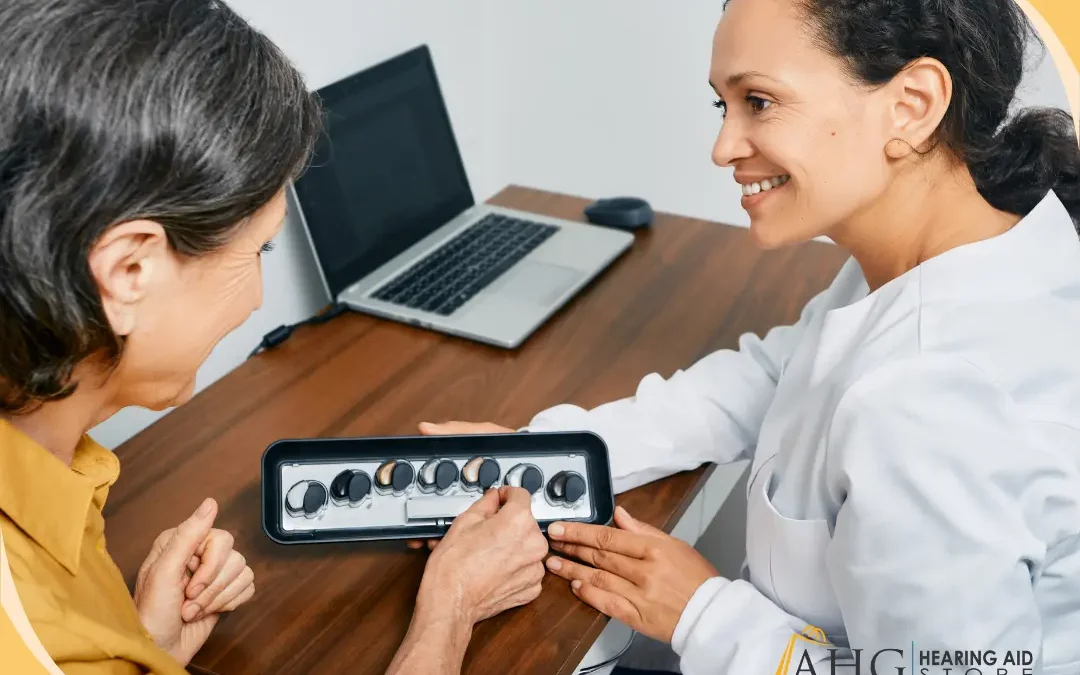 If you’ve noticed difficulty hearing in certain situations, you might be considering hearing aids to improve your quality of life. However, with the recent availability of over-the-counter (OTC) hearing aids, you may be wondering how they compare to prescription hearing aids. In this blog, we’ll answer common questions about OTC hearing aids, explore how they differ from prescription hearing devices, and help you decide which might be the best choice for your unique needs.
If you’ve noticed difficulty hearing in certain situations, you might be considering hearing aids to improve your quality of life. However, with the recent availability of over-the-counter (OTC) hearing aids, you may be wondering how they compare to prescription hearing aids. In this blog, we’ll answer common questions about OTC hearing aids, explore how they differ from prescription hearing devices, and help you decide which might be the best choice for your unique needs.
Once you recognize that you have a hearing problem, the next step is to determine the type and severity of your hearing loss. To do this, you essentially have two options: an online hearing test or an in-person test with a hearing professional. Let’s take a closer look at the difference between them.
What are the Limitations of Online Hearing Tests Compared to Professional Exams?
When considering solutions for hearing loss, it’s crucial to understand the limitations of online hearing tests versus professional exams. While online options may seem convenient, they lack the comprehensive evaluation provided by a qualified hearing health professional.
1. Comprehensive Hearing Loss Diagnosis
Professional hearing exams offer a thorough analysis of your hearing capabilities. An audiologist or hearing specialist performs a detailed physical examination of your ears, complemented by a series of auditory tests. This process helps identify not just the extent, but also the cause of your hearing loss.
Online tests generally miss this depth of assessment, often overlooking potential issues such as ear wax buildup, which can be easily treated without the need for hearing aids.
Related Video: 6 Reasons to Get a Hearing Test
2. Tailored Hearing Solutions
Professional hearing evaluations lead to personalized hearing aid prescriptions, tailored to your specific needs. Hearing specialists ensure that devices are correctly fitted and adjusted, providing maximum benefit.
Online tests, on the other hand, offer generic solutions that can result in ill-fitting or improperly adjusted devices, which may not effectively address your hearing loss.
3. Risk of Incomplete Information:
Online hearing tests fail to provide a complete picture of your auditory health. They cannot replicate the nuanced diagnostic process conducted by hearing professionals. Without a comprehensive evaluation, you might end up using a device that is not appropriate for your condition, potentially exacerbating the issue or masking underlying medical problems.
Ultimately, while online hearing tests offer a degree of convenience, they cannot compete with the thorough and personalized care that professional exams provide. For individuals experiencing hearing issues, consulting with a hearing health professional ensures the right diagnosis, treatment, and follow-up care, tailored specifically to your needs.
Related Video: What Can I Expect During a Hearing Test?
Exploring Hearing Aid Styles: The Most Common Types of Hearing Aids
If a thorough hearing exam indicates the need for hearing aids, there are several options to choose from and selecting the right hearing aid can significantly impact your quality of life. Each hearing aid style comes with unique features and benefits:
- Behind-the-Ear (BTE): These devices sit comfortably behind the ear, with a tube connecting to an earmold inside the ear canal. They are suitable for a wide range of hearing loss levels and are durable and easy to handle.
- Over-the-Ear (OTE): Similar to BTEs, these are slightly modified for a more discreet look, often favored by those seeking a balance between performance and aesthetics.
- In-the-Canal (ITC): Compact and custom-fitted, ITC hearing aids are molded to the ear’s contours. They are less visible than BTE models and typically offer features like volume control for moderate hearing loss.
- Completely-in-the-Canal (CIC): Among the smallest options, CIC aids fit entirely inside the ear canal. Their discreet design makes them nearly invisible, perfect for mild to moderate hearing loss, although they might lack some advanced features due to their size.
When choosing a hearing aid, consider factors like the severity of hearing loss and the size and shape of your ears. This ensures tailored comfort and optimal hearing enhancement.
Now that you’re familiar with the hearing aid styles available, let’s talk about how and where to get them. For this step, you can either buy over-the-counter (OTC) hearing aids or purchase prescription devices with the assistance of a hearing professional.
Related Video: 6 Steps to Getting Hearing Aids
Do You Need a Prescription for Hearing Aids?
You do not need a prescription to purchase OTC hearing aids, which makes them more accessible to the general public. However, prescription hearing aids still require a hearing test and evaluation by a licensed audiologist. This process is essential for diagnosing the extent of your hearing loss and ensuring that the hearing aids you choose are tailored to your specific needs.
Working with an audiologist also provides peace of mind that your hearing health is being monitored and that any underlying conditions, such as ear infections or impacted ear wax, are addressed.
Are OTC Hearing Aids as Good as Prescription Hearing Aids?
While over-the-counter hearing aids can be a good starting point for some individuals, they are generally not as effective as prescription hearing aids. Prescription hearing aids are custom-fitted by audiologists to suit your specific hearing loss, lifestyle, and preferences. Advanced features, which we’ll cover in just a moment, are often included in prescription hearing aids but are less common in OTC models. Furthermore, prescription hearing aids come with professional support, such as adjustments and follow-up care, to ensure they continue to work well for you over time.
For individuals with severe or profound hearing loss, OTC hearing aids are unlikely to provide the necessary amplification and clarity, making prescription hearing aids the better option.
Related Video: How to Choose the Best Hearing Aids
Understanding the Technological Differences: OTC vs. Prescription Hearing Aids
Both OTC devices and prescription models aim to improve hearing, but they do so in significantly different ways due to their technological capabilities.
OTC Hearing Aids: Basic Functionality
Over-the-counter hearing aids primarily focus on amplifying sounds to assist those with mild to moderate hearing loss. These devices provide a straightforward solution but come with some limitations:
- Limited Customization: Most OTC hearing aids offer basic sound amplification without the ability to adjust settings for different environments.
- Minimal Connectivity: They typically lack advanced wireless features, making it difficult to integrate with other smart devices.
Prescription Hearing Aids: Advanced Features
Prescription hearing aids, tailored and fitted by healthcare professionals, offer a range of advanced technologies that adapt to user needs:
- Direct Audio Streaming: With wireless connectivity, your hearing aids can stream audio directly from your smart TV and smartphone. Whether you’re watching movies or taking calls, the sound is delivered straight to your ears.
- Noise Management Technology: In crowded or noisy environments, advanced noise-filtering capabilities help reduce background noise, allowing you to focus on the conversation at hand.
- Directional Sound Controls: Adjust the way your hearing aids capture sound by focusing on specific sources while blocking out unwanted ambient noise.
- Health and Activity Tracking: Some models come with built-in sensors for monitoring your physical activity and overall health metrics, adding an extra layer of utility.
- Hands-Free Phone Calls: Effortlessly manage phone calls without needing to use your hands, an especially convenient feature for smartphone users.
- Custom Sound Amplification: Prescription hearing aids are designed to amplify only specific tones based on personal hearing loss profiles, ensuring a more natural listening experience.
While OTC devices offer a basic and affordable entry into hearing assistance, prescription hearing aids deliver a highly customizable and feature-rich experience. This makes them a superior choice for those seeking comprehensive auditory support and seamless integration with modern technology.
How Much Do Prescription Hearing Aids Cost?
The price of prescription hearing aids can vary widely depending on the brand, features, and technology. On average, a pair of prescription hearing aids ranges from $1,000 to $6,000. While this may seem expensive, many people find the investment worthwhile due to the superior sound quality, customization, and professional support that prescription hearing aids offer.
Exploring the Price Differences Between OTC and Prescription Hearing Aids
When considering the price variation between over-the-counter and prescription hearing aids, it’s important to not just think about the initial outlay, but also the value and services each provides.
Initial Cost Comparison
OTC hearing aids are often appealing due to their lower upfront costs. They are designed to be more accessible and typically require no visit to a healthcare provider, which can save money initially. However, these savings come with trade-offs.
What You Miss with OTC Hearing Aids
Choosing OTC hearing aids means forgoing several beneficial services that come with prescription hearing aids. Here’s what you might miss out on:
- Professional Hearing Assessment: Prescription hearing aids include a thorough evaluation to diagnose your hearing loss.
- Tailored Solutions: Professionals customize hearing aids to fit your specific hearing profile.
- Expert Calibration and Fittings: Ensuring perfect tuning for your unique needs is crucial.
- Ongoing Adjustments: As your hearing changes over time, regular tweaks are easily available with prescription hearing devices.
- Maintenance and Support: Hearing aid cleaning and maintenance, as well as ear canal cleaning, are often provided by the same professionals who offer prescription hearing aids.
Potential Cost of Experimentation
With OTC hearing aid options, you might end up spending more trying different models to find the right fit. This can be both time-consuming and costly.
Ways to Manage Prescription Hearing Aid Costs
For those concerned about the higher initial cost of prescription hearing aids, several strategies can help manage expenses:
- Health Insurance Coverage: Some health insurance plans may offer partial or complete coverage for hearing aids. It’s important to consult with your insurance provider to understand the specifics of your plan.
- Payment Plans or Healthcare Financing: Talk to your healthcare provider to learn about options that might allow you to pay for hearing aids over time rather than all at once.
- Health Savings Accounts (HSAs): If you have an HSA, you can use pre-tax dollars to pay for your hearing aids. This can help reduce the overall cost by taking advantage of tax benefits.
- Flexible Spending Accounts (FSAs): Similar to HSAs, FSAs allow you to set aside pre-tax money for healthcare expenses, including hearing aids. This can help you save on taxes and manage costs more effectively.
While OTC hearing aids may seem appealing due to their lower starting cost, the comprehensive care and long-term satisfaction offered by prescription solutions often justify the investment. It’s wise to consult with a hearing healthcare provider to explore which option best fits your lifestyle and financial situation.
Where to Get Prescription Hearing Aids in Mesa or Scottsdale, AZ
Choosing the right hearing aids can feel overwhelming, but you don’t have to do it alone. At Advanced Hearing Group, our audiologists in Mesa and Scottsdale, AZ are here to guide you through the process. We provide comprehensive hearing evaluations to determine the extent of your hearing loss and help you determine the best hearing aids for YOU.
If prescription hearing aids are the right choice, we’ll help you find a pair that fits your unique needs, lifestyle, and budget. With ongoing support, adjustments, and expert care, we’re dedicated to ensuring that you get the most out of your hearing aids.
Don’t let hearing loss hold you back from enjoying the world around you. Contact us today to schedule an appointment at our Mesa or Scottsdale office and take the first step toward better hearing health.





